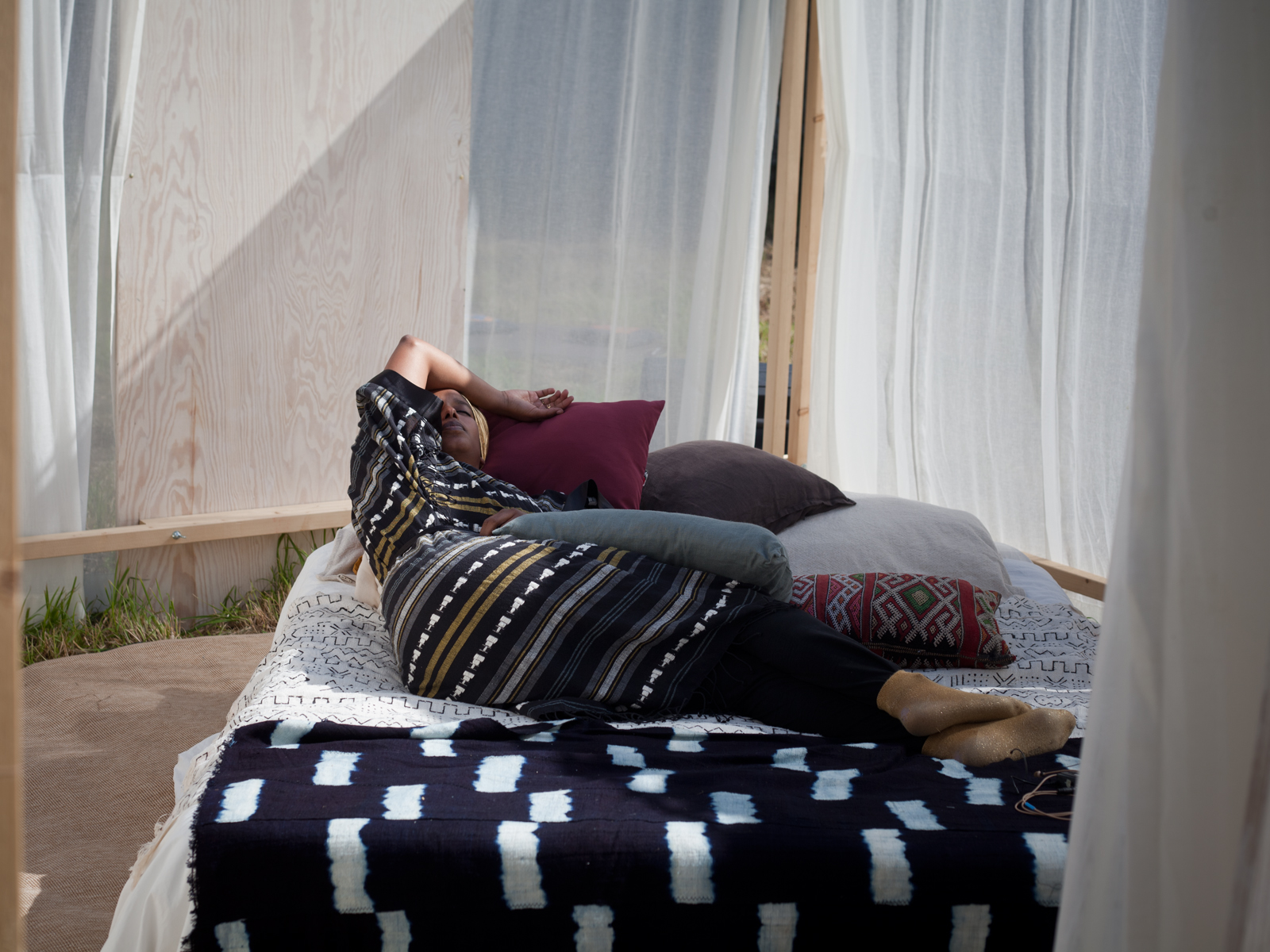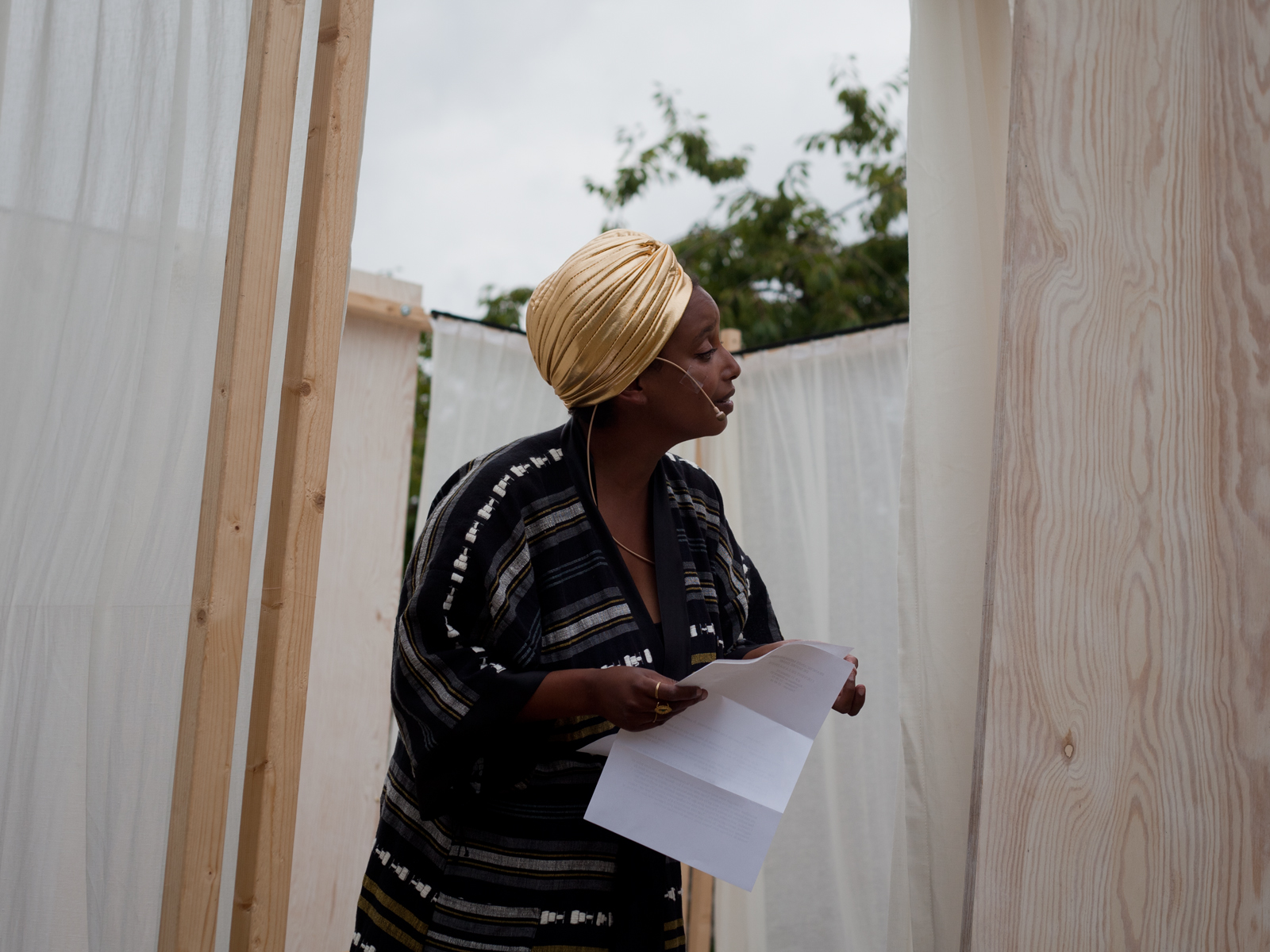© Julie Hascoet
Jusque dans nos lits
During a week-long residency, Lucie Choquet met with young people from the MNA hostel and the contact person from the Emmaüs community in Hédé-Bazouges. Of Ethiopian origin and adopted by a French family, her project aims to give a voice to people who, like her, are not of the majority skin color. She wants to offer a space for exchange, a space exclusively reserved for people who experience racism from the side of the oppressed. Through the Accueil MNA and the Emmaüs community, she was able to meet several people in this situation to gather their testimonies and propose that they take part in her project, already knowing that she would return to the Théâtre de Poche for another residency and a presentation of the project in 2021.
Associated partners: Communauté Emmaüs de Hédé-Bazouges, Accueil MNA - Mineurs Non Accompagnés de Hédé-Bazouges / Département d'Ille-et-Vilaine
In a large wooden structure surrounded by semi-transparent curtains, performer Lucile Saada Choquet welcomes on a bed racialized people who identify themselves as black, Arab, Amazigh, Asian, Latin or mixed-race. Each encounter lasts 30 minutes, and guests are invited to discuss their relationship with the bed, their bodies and their heritage. The Jusque dans nos lits installation is a time-space dedicated to non-productivity, giving pride of place to vulnerability and listening to contemporary racialized heroines. Lucile Saada Choquet weaves links between her guests based on their shared experience of racial discrimination. It's a work of memory of the colonial trauma that impacts each of us differently. This installation is an attempt to repair our collective memory, with those who speak and those who learn to remain silent. This first artistic gesture can be seen as a gift to all, where we dream of a collective empowerment of systematically minoritized narratives.
"As an adopted black woman, I need to kill my own racism. These encounters concern us all, revealing collective imaginations in motion”. Lucile Saada Choquet
Crédits
Concept and performance Lucile Saada Choquet
Dramaturgy Petra Van Brabandt
Set design Aria Ann
Technical direction Inès Isimbi
Stage Manager Inès Isimbi or Valentin Coppens
Costumes Pierre Antoine Vettorello
Development, production, distribution Habemus papam
Production A creation by Lucile Saada Choquet hosted by Habemus papam, produced with the support of Café Congo (Brussels). Project hosted and supported as part of the ROM network - Residencies On the Move - a collaboration with Balsamine (Schaerbeek/Belgium), Grütli (Geneva/Switzerland), Théâtre de Poche (Hédé-Bazouges/France). With the support of La Chaufferie - Acte 1, La Bellone, Mons/Mars and Rideau de Bruxelles. With the support of the Fédération Wallonie-Bruxelles, service général de la Création artistique.
Lucile Saada Choquet
Lucile Saada Choquet (she/adopted - FR) is a decolonial artist based in Brussels. After studying performing arts in Normandy, she trained as an actress at Arts²/Ecole Supérieure des Arts (Belgium). Coming from an artistic background rooted in a racist, Eurocentric cultural heritage, she develops and questions her own artistic language. Defining herself as an artivist, Lucile Saada experiments with a decolonial practice of art (staging, acting, dramaturgy) in every gesture she makes. Concerned with the trace, she creates scenic devices-performances, installations-that bring political bodies into play and rethink collective imaginations. With her first creation, JUSQUE DANS NOS LITS, she situates her work in the context of collective reparation for colonial trauma. Her radical artistic choices embrace issues of representation in terms of gender, race and class. Since 2021, Lucile Saada has been a member of the Collectif Associé of Théâtre Le Rideau (Brussels). She is also a partner artist of Théâtre Varia (Brussels) and associated with Théâtre de Liège for the period 2024-2028. She is currently initiating an artistic investigation into transracial and transnational adoption as part of the European Future Laboratory program. Her work has been awarded the Prix Jo Dekmine 2022.




